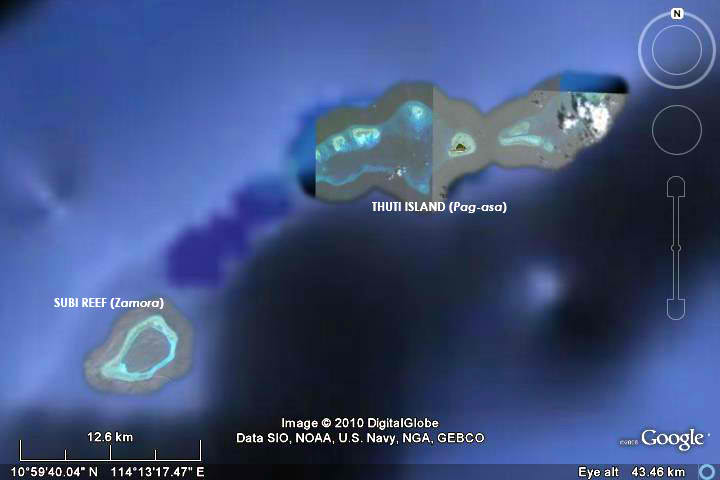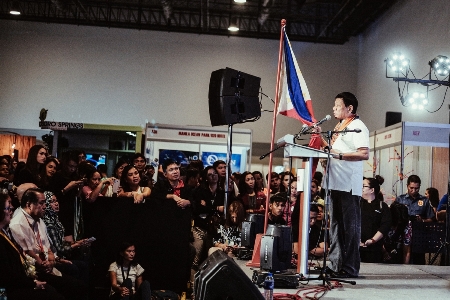By ELLEN T. TORDESILLAS
 WHILE in Jakarta last week representing President Aquino in the 60th anniversary of the Asia-Africa Conference, Vice President Jejomar Binay articulated what could be a foreign policy shift for the country if he succeeds in his ambition to become president.
WHILE in Jakarta last week representing President Aquino in the 60th anniversary of the Asia-Africa Conference, Vice President Jejomar Binay articulated what could be a foreign policy shift for the country if he succeeds in his ambition to become president.
““China has all the capital and we have the property so why don’t we try and develop that property as a joint venture?” he said.
This is not actually new. Binay disclosed this in an interview with Manila Times’ Efren Danao last year.
Amid concerns expressed by President Aquino and Foreign Secretary Albert del Rosario over massive reclamations being done by China around their occupied reefs in the disputed Spratlys in South China Sea, Binay further said: “Personally, my feeling is we will continue to insist (on) our sovereignty over those properties but at the same time we hope we can create a situation where we can improve bilateral relations with China.”
Senior Associate Justice Antonio Carpio, who has been conducting a series of lectures on the South China Sea dispute, said in his lecture last April 27 with judges and justices that joint development of the Spratlys with China is not possible without violating the Constitution.
Carpio said, “China’s offer of joint development in the Spratlys has one pre-condition – that the other state concedes to China indisputable sovereignty over the Spratlys. No claimant state has accepted, or will ever accept, China’s offer because acceptance means the accepting state must immediately vacate any island it occupies in the Spratlys since that is the consequence of admitting China’s sovereignty over the Spratlys.”
Carpio pointed out that the Kalayaan Island Group (KIG) is part of Philippine national territory as defined in the Philippine Baselines Law (RA No. 3046, as amended by RA No. 5446 and RA No. 9522) and in Article 1 of the 1987 Philippine Constitution on the National Territory.
“Any President who concedes sovereignty over the KIG to China culpably violates the Constitution and commits an impeachable act,” he said.

Carpio also underscored Section 2, Article XII of the 1987 Constitution that mandates the “State shall protect the nation’s marine wealth in its xxx exclusive economic zone, and reserve its use and enjoyment exclusively to Filipino citizens.”
“Conceding to China sovereignty over the Spratlys, whose surrounding waters facing Palawan form part of the Philippines’ EEZ, or even just allowing China to use and enjoy the Philippines’ marine wealth in these waters, violates Section 2, Article XII of the Constitution. Any President who violates this constitutional provision commits an impeachable act,” he said.
This idea of setting aside the issue of sovereignty for a joint development by claimant countries in the disputed waters of South China Sea was tried in 2004 by the administration of Gloria Arroyo.
The Philippines, China and Vietnam undertook the Joint Marine Seismic Undertaking (JMSU) over a large portion of the Spratlys. Findings in that “seismic undertaking” would be used in the next phase of the cooperation which was joint development.
Even in the JMSU, they had to refrain from using the word “exploration” which foreigners are banned from undertaking in Philippine territory.
SECTION 2, Article XII of the Constitution cited by Carpio also states that, “The exploration, development, and utilization of natural resources shall be under the full control and supervision of the State. The State may directly undertake such activities, or it may enter into co-production, joint venture, or production-sharing agreements with Filipino citizens, or corporations or associations at least sixty per centum of whose capital is owned by such citizens.”
Another problem with the JMSU was, the area explored was all within the 200 nautical miles Exclusive Economic Zone of the Philippines. No EEZ of China and Vietnam was explored. It even covered Philippine territory that are undisputed.
Results of that exploration masked as “seismic undertaking” have not been made public but sources said data on the disputed Reed Bank provided by the Chinese to the Philippines was vague.
In 2008, Bayan Muna partylist questioned the JMSU’s legality before the Supreme Court, and the case remains unresolved.
At least, this early, Binay or whoever wins in the 2016 elections is forewarned.




